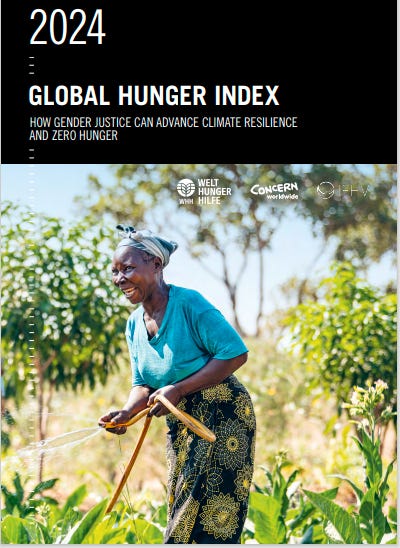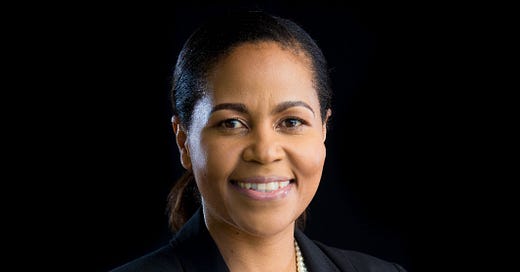
Gender Justice Crucial for Food Security Amidst Climate Change, 2024 Global Hunger Index
The 2024 GHI report serves as a powerful call to action, urging a collective effort to address the pressing challenges of hunger, climate change, and gender inequality.
LILONGWE, Malawi—The 2024 Global Hunger Index (GHI) report reveals that progress in combating hunger has stagnated, while climate change poses growing threats to food systems, writes Winston Mwale.
Launched in Lilongwe on Wednesday, the report, titled "2024 Global Hunger Index: How Gender Justice Can Advance Climate Resilience and Zero Hunger," emphasises the urgent need for gender-transformative approaches to address these interconnected challenges, as gender inequality remains a significant obstacle to achieving food security.
Hunger: A Persistent Global Challenge
The report highlights a concerning trend: global progress against hunger has slowed significantly over the past decade. While the world made substantial strides between 2000 and 2016, reducing the global GHI score by approximately one-third, this momentum has faltered.
The 2024 GHI score for the world stands at 18.3, classified as 'moderate,' a slight improvement from the 2016 score of 18.8.
However, this seemingly positive trend masks stark regional disparities, with Africa South of the Sahara and South Asia bearing the brunt of the burden, where hunger levels remain'serious'.
At the current rate of progress, the world is not projected to reach 'low hunger' until 2160, a staggering 130 years from now.
This grim projection underscores the urgency of addressing the multifaceted factors contributing to hunger, including conflict, climate change, economic shocks, and persistent gender inequality.
Climate Change: An Escalating Threat to Food Security
The GHI report acknowledges the growing impact of climate change on food systems globally.
Extreme weather events, such as droughts, floods, and heat waves, are becoming more frequent and intense, disrupting agricultural production, displacing communities, and exacerbating food insecurity.
These climate shocks disproportionately affect regions already grappling with poverty and hunger, further jeopardizing their fragile food systems and pushing millions into precarious situations.
Gender Inequality: A Barrier to Resilience and Progress
The report places particular emphasis on the role of gender justice in building climate resilience and achieving Zero Hunger.
"Inequality based on gender is one of the most pervasive threats to sustainable development and the realization of the right to food," the report asserts.
Gender discrimination impedes equitable access to, use of, and control over essential resources, such as land and credit, further hampering coping capacity in the face of climate shocks and stressors.
The GHI report underscores the importance of promoting gender-transformative approaches across all sectors, ensuring women's equal participation in decision-making processes, and addressing discriminatory norms and practices that perpetuate inequality.
These measures are deemed essential to empower women, enhance their resilience, and enable them to contribute effectively to food security and climate adaptation efforts.
Case Studies: Highlighting the Transformative Power of Gender Justice
The report presents compelling case studies from various countries, demonstrating the tangible benefits of empowering women in agriculture and food systems.
In South Sudan, a project by Welthungerhilfe (WHH) focused on engaging both women and men in decision-making and resource ownership related to climate adaptation activities, such as tree planting and agroforestry. The project found that "activities to boost climate adaptation, like tree planting and agroforestry, picked up significantly when both women and men were equally involved in decision-making and ownership of resources." This case study underscores the importance of inclusive approaches that recognize and value the contributions of both genders to achieve sustainable and resilient outcomes.
In Madagascar, where women face significant barriers to education and economic opportunities, coupled with high rates of sexual and gender-based violence, a WHH project focused on supporting women’s care groups and promoting positive masculinity. This initiative facilitated the adoption of nutrition-sensitive agricultural techniques, improved soil and seed resilience to climate change, and empowered women by enhancing their visibility and recognition as capable agents of change within their communities.
In Malawi, a couple enrolled in Concern Worldwide's "Umodzi" program participated in training sessions that explored gender norms and equitable practices. This experience enabled them to transform their household dynamics by sharing responsibilities, demonstrating the transformative power of addressing gender norms to achieve greater equality and shared benefits.
Policy Recommendations: A Call for Collective Action
The GHI report concludes with a comprehensive set of policy recommendations directed at policymakers and practitioners to address the interconnected challenges of hunger, climate change, and gender inequality.
These recommendations call for:
Strengthening accountability to international law and the enforceability of the right to adequate food. States must uphold their legal obligations to eliminate gender discrimination and ensure food security for all, particularly during crises. This includes promoting compliance with human rights, humanitarian, and criminal law and supporting judicial efforts against perpetrators who use starvation as a weapon of war.
Promoting gender-transformative approaches to food systems and climate policies and programs. Policymakers and practitioners should recognize the diverse needs and vulnerabilities of individuals and communities, ensuring that policies and programs are inclusive and address the root causes of gender inequality. This involves supporting women's organizations, promoting women's leadership, and integrating gender considerations into all aspects of food systems and climate action.
Increasing investments in social protection, climate adaptation and mitigation, and conflict prevention and peacebuilding. This entails strengthening social safety nets to cushion vulnerable populations from the impacts of climate shocks, investing in climate-resilient agriculture and infrastructure, and promoting peaceful resolutions to conflicts that disrupt food systems and exacerbate hunger.
A Pathway to a Just and Sustainable Future
The 2024 GHI report serves as a powerful call to action, urging a collective effort to address the pressing challenges of hunger, climate change, and gender inequality.
By prioritizing gender justice, investing in sustainable food systems, and upholding the right to adequate food for all, we can pave the way towards a more equitable, resilient, and food-secure world.
*Download the report below:











